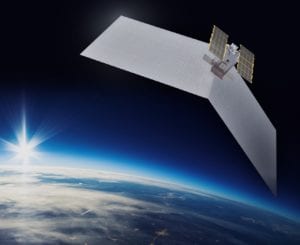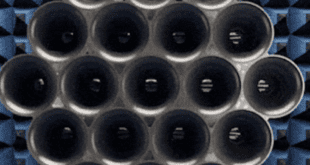
Capella Space, an information services company providing Earth observation data on demand, today announced it will launch seven synthetic aperture radar (SAR) satellites and start commercial operations in 2020. Powering this next step are Capella’s breakthrough engineering technology innovations that make it the first small satellite SAR company in the industry to capture truly sub-0.5m very high-resolution (VHR) imagery. What’s more, is Capella’s ultra-high capacity to capture more images per satellite relative to other small SAR satellites and its ability to deliver SAR data to customers in less than 30 minutes from collection with real-time tasking. Capella’s technology advances over the past year produce economic benefits that cemented major deals with multiple divisions of the U.S. government, including a contract with the U.S. Air Force. Capella is fully funded to complete its seven satellite constellation launch in 2020, with very significant backing from multi-billion-dollar funds DCVC (Data Collective) and Spark Capital.
“Capella embodies DCVC’s mission of applying breakthrough technology to transform major industries while also generating impressive returns,” said Dr. Chris Boshuizen, partner at DCVC and co-founder of Planet Labs. “Their audacious choice of technology gives them a collection capacity that nobody else can deliver, with unit economics that are five times better than the status quo. With new advancements allowing sub-0.5 meter very high-resolution, impressive partnerships and a commitment to delivering imagery in real-time, Capella reminds me of where Planet was in the optical market several years back: on the cusp of breaking open a massive new commercial opportunity.”
Setting a new technological standard for the industry, Capella’s first wave of operational satellites will feature sub-0.5 meter VHR to capture images of unparalleled quality. The new constellation of satellites will also achieve impressive energy efficiency that enables imaging for up to 10 minutes per orbit, marking a fivefold increase over other small satellite competitors. Combined, the advances mean Capella can deliver more higher-quality images in less time than competitors.
Over the past year, Capella also entered into industry-leading agreements with Inmarsat, Addvalue and Amazon Web Services (AWS) to task satellites in real-time and rapidly deliver frequent, timely and flexible SAR data via the AWS Ground Station network. As a result, Capella is the first and only Earth observation company that can accept and task its satellites in real-time, making it virtually latency free. The company will accept and task its constellation in real-time and deliver imagery to customers within on-average 30 minutes of collection. As the industry average from order to delivery is typically eight hours and can be as long as several days, Capella outperforms rivals with speeds that are more than 16 times faster.
“Just as strong data networks made the magic of the smartphone a reality, Capella will deliver real-time information customers need to create world-changing applications we’ve only dreamed of,” said Payam Banazadeh, CEO and founder of Capella Space. “By investing in our technology we’re producing unbeatable economics, which in turn has sparked strong customer demand from the most innovative and exacting organizations on the planet. We’re positioning Capella to reshape a multitude of industries and take on some of our planet’s biggest challenges across commerce, conservation and security.”
Government and commercial markets increasingly demand this type of real-time Earth observation data. This demand, and Capella’s superior technology, have driven multi-million dollar contracts with eight customers in 2019, including federal government customer wins announced — U.S. Air Force and National Reconnaissance Office — and multiple others across key use cases:
- Defense & Intelligence: Persistent monitoring of specific sites and Areas of Interest (AOIs), differentiation between service vs. military vehicles and aircraft types
- Insurance: Independent verification of damage claims from flooding, fire and hurricanes
- Disaster Management: Identification of survivors and rescue and relief operations
- Energy, Oil & Gas: Detection of oil spills, digital elevation mapping and security monitoring
- Urban Development/Infrastructure: Monitoring and measuring structural integrity and safety at millimetre levels for dams, bridges, buildings and railways
- Maritime: Identification and tracking of vessels, illegal shipments and oil spill monitoring
“DCVC is a leading investor in the pre-eminent commercial space companies because we have a deep understanding of the technology and operational know-how that is required to build a successful business in space,” said Matt Ocko, managing partner at DCVC. “Through its capital efficiency and unique technological advantage, Capella Space is delivering unprecedented on-demand images of our Earth to customers across industries, including the U.S. Federal Government, which has shown extraordinary enthusiasm and support for the vital – and commercially unparalleled – intelligence Capella provides.”
Capella Space is an information services company that provides on-demand sub-0.5m very high-resolution (VHR) Synthetic Aperture Radar (SAR) Earth observation imagery. Through a constellation of small satellites, Capella is providing easy access to frequent, timely and flexible information affecting dozens of industries worldwide. Capella’s high-resolution SAR satellites are matched with unparalleled infrastructure to deliver reliable global insights that sharpen our understanding of the changing world – improving decisions about commerce, conservation and security on Earth.
 SpaceWatch.Global An independent perspective on space
SpaceWatch.Global An independent perspective on space




